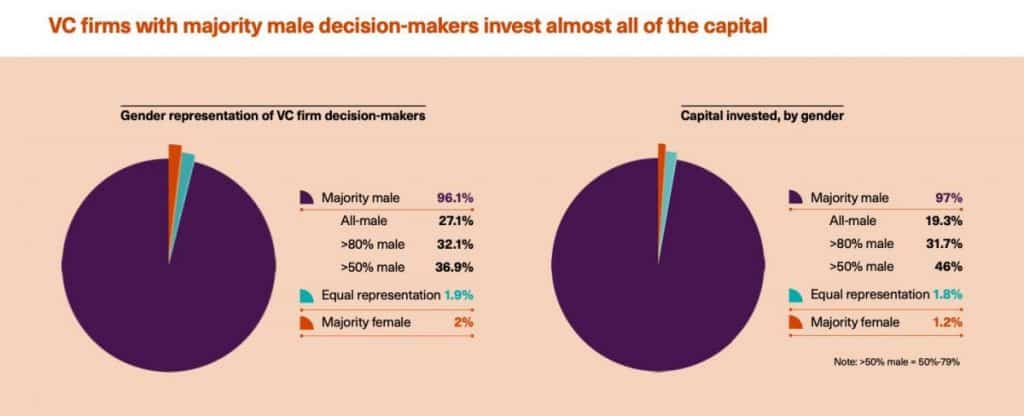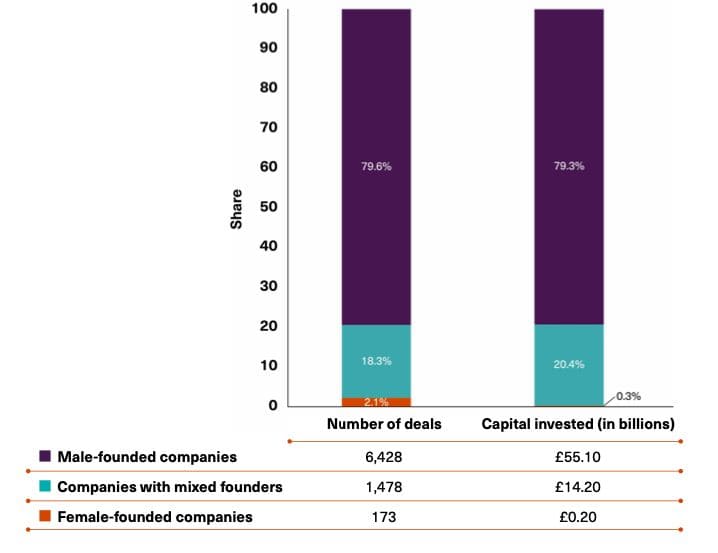Female-Led AI Startups Face Funding Hurdles, Receiving Less Than 3% of VC Support


In Brief
The Alan Turing Institute’s study, “Rebalancing Innovation: Women, AI and Venture Capital in the UK,” uncovers a striking gender gap in AI-focused venture capital (VC) funding.
Female-founded companies account for less than 3% of VC deals in the AI startup landscape, with all-female teams receiving a mere 0.3% of total funding.
Female-led AI startups also face significant disparities in funding amounts, receiving on average six times less capital per deal compared to their male-founded counterparts.

The Alan Turing Institute’s Women in Data Science and AI team recently exposed a startling gender disparity in venture capital (VC) funding within the AI startup landscape.
The study, titled “Rebalancing Innovation: Women, AI and Venture Capital in the UK,” highlights that female-founded companies account for less than 3% of VC deals involving AI startups. The report underscores the urgent need to address gender inequality in VC funding and suggests key recommendations to foster diversity within the tech entrepreneurship ecosystem.
Between 2012 and 2022, 80% of total VC funding in AI was raised by all-male teams, while all-female teams secured a mere 0.3%. Moreover, when female-founded AI startups did secure funding, they received, on average, six times less capital per deal than their male-founded counterparts, with all-female teams raising an average of £1.3 million per deal compared to £8.6 million by all-male teams.


Despite these challenges, there is a glimmer of progress, with the share of VC deals secured by female-founded companies increasing from 4% in 2012 to 6% in 2022, offering hope for greater gender diversity in the startup ecosystem.
The report also sheds light on the gender makeup of decision-making teams within VC firms, revealing that only 5% of participating VC firms have an equal or majority representation of women at the decision-maker level. This stark imbalance in funding and decision-making underscores the need for urgent action to address gender inequality in the VC ecosystem, particularly in the context of the booming generative AI industry.
To bridge this gap, the report offers key recommendations that include reforms in recruitment and promotion practices at VC firms, promotion of inclusive cultures, monitoring of investment practices and efforts to diversify the entire entrepreneurial ecosystem.
The research, based on data from 2012 to 2022 sourced from Pitchbook, emphasizes the critical importance of leveling the playing field in VC funding to promote responsible AI development and foster innovation.
“Tackling this gender gap is a key mission for Turing’s Public Policy Programme, and working towards more equitable participation in the funding landscape will play a crucial role. The Women in Data Science and AI team remain at the forefront of identifying and addressing gender inequality in these areas; I am looking forward to the next steps for this vital research,”
said Dr. Erin Young, Research Fellow and Project Co-Lead at The Alan Turing Institute.
A Concerning Picture of Gender Diversity in AI-Centric VC Investment
AI is one of the most promising and impactful fields of innovation in the world today. However, the lack of gender diversity in AI-focused VC investment is not only a matter of fairness and inclusion but also a missed opportunity for innovation and growth. Studies have shown that diverse teams produce better outcomes, especially in complex and creative domains like AI.
Moreover, AI applications have the potential to affect every aspect of society, so they must be developed and funded by diverse perspectives that can address the needs and challenges of different groups of people.
Therefore, the AI-focused VC industry must take concrete steps to increase gender diversity and foster a more inclusive and equitable environment for women entrepreneurs and investors.
California is on the verge of passing legislation that would require venture capital firms to disclose the gender and race of the founders of the companies they invest in.
A bill currently awaiting Governor Gavin Newsom’s signature could make California the first state to compel venture capital firms to disclose the demographic information of the founders they fund, in a bold move to address the stark lack of diversity in the tech startup world.
While opponents characterize it as bureaucratic interference, proponents argue it’s a crucial step towards leveling the playing field in Silicon Valley.
Recent data shows that just 2% of venture capital funding in the industry went to companies founded by all-female teams. Moreover, Black women and Latinas received even less, a mere 0.85%, highlighting the pressing need for change.
Disclaimer
In line with the Trust Project guidelines, please note that the information provided on this page is not intended to be and should not be interpreted as legal, tax, investment, financial, or any other form of advice. It is important to only invest what you can afford to lose and to seek independent financial advice if you have any doubts. For further information, we suggest referring to the terms and conditions as well as the help and support pages provided by the issuer or advertiser. MetaversePost is committed to accurate, unbiased reporting, but market conditions are subject to change without notice.
About The Author
Agne is a journalist who covers the latest trends and developments in the metaverse, AI, and Web3 industries for the Metaverse Post. Her passion for storytelling has led her to conduct numerous interviews with experts in these fields, always seeking to uncover exciting and engaging stories. Agne holds a Bachelor’s degree in literature and has an extensive background in writing about a wide range of topics including travel, art, and culture. She has also volunteered as an editor for the animal rights organization, where she helped raise awareness about animal welfare issues. Contact her on [email protected].
More articles

Agne is a journalist who covers the latest trends and developments in the metaverse, AI, and Web3 industries for the Metaverse Post. Her passion for storytelling has led her to conduct numerous interviews with experts in these fields, always seeking to uncover exciting and engaging stories. Agne holds a Bachelor’s degree in literature and has an extensive background in writing about a wide range of topics including travel, art, and culture. She has also volunteered as an editor for the animal rights organization, where she helped raise awareness about animal welfare issues. Contact her on [email protected].


















































